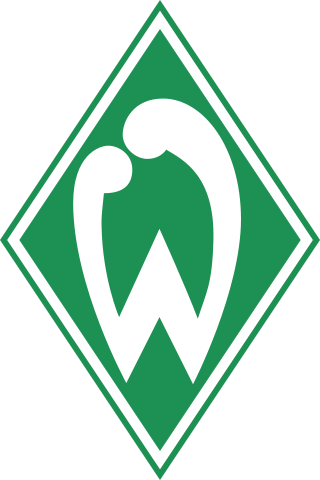
Claudio Miguel Pizarro Bosio is a Peruvian former professional footballer who played as a striker. He is currently serving as club ambassador for Bayern Munich. He was captain of Peru's national football team, being its fifth highest scorer. He is the highest scorer and most successful Latin American football player in the history of German football. He is the all-time top scorer of SV Werder Bremen, the ninth top scorer in the history of Bayern Munich and the sixth top scorer in the history of the Bundesliga and its second top scorer in the 21st century. He is also among the 20 top scorers in the history of UEFA club competitions and is the seventh highest South American scorer in European football history.

Thomas Schaaf is a German professional football manager, who last managed Werder Bremen and former player who played as a defender. A 'one-club man', Schaaf spent his entire playing career with Bundesliga club Werder Bremen. He started coaching the team in 1999 and stepped down in 2013, being one of the longest-serving coaches in the Bundesliga.

Mario Basler is a German football manager and former professional player who mainly played as a right midfielder. He is currently at TSG Eisenberg as a player and advisor.

The DFL-Supercup or German Super Cup is a one-off football match in Germany that features the winners of the Bundesliga championship and the DFB-Pokal. The DFL-Supercup is run by the Deutsche Fußball Liga.

Sokratis Papastathopoulos, also known mononymously as Sokratis, is a Greek former professional footballer who played as a centre-back.

Sportverein Werder Bremen von 1899 e. V., commonly known as Werder Bremen, Werder or simply Bremen, is a German professional sports club based in the Free Hanseatic City of Bremen. Founded on 4 February 1899, Werder are best known for their professional association football team, who compete in the Bundesliga, the first tier of the German football league system. Bremen share the record for most seasons played in the Bundesliga with Bayern Munich, and are ranked third in the all-time Bundesliga table, only behind Bayern and Borussia Dortmund.
Manfred "Manni" Burgsmüller was a German professional footballer who played mainly as a striker; he also occasionally operated as a midfielder.

Serge David Gnabry is a German professional footballer who plays as a forward for the Bundesliga club Bayern Munich and the Germany national team.

Niklas Süle is a German professional footballer who plays either as a centre-back or right-back for Bundesliga club Borussia Dortmund and the Germany national team.
The 1990–91 FC Bayern Munich season was the 91st season in the club's history and 26th season since promotion from Regionalliga Süd in 1965. Bayern finished three points behind champions 1. FC Kaiserslautern in the Bundesliga. In the DFB-Pokal, Bayern were eliminated in the first round for the first time in club history. Bayern reached the semifinals of the European Cup before being eliminated by Red Star Belgrade due to an own goal in the 90th minute of the second leg. The first competitive match of the season was the DFB-Supercup on 31 July which Bayern won by a score of 4–1 over 1. FC Kaiserslautern.
The Bundesliga was founded as the top tier of German football at the start of the 1963–64 season. The following is a list of records attained in the Bundesliga since the league's inception.
The 2015–16 DFB-Pokal was the 73rd season of the annual German football cup competition. Sixty-four teams participated in the competition, including all teams from the previous year's Bundesliga and the 2. Bundesliga. It began on 7 August 2015 with the first of six rounds and ended on 21 May 2016 with the final at the Olympiastadion in Berlin, a nominally neutral venue, which has hosted the final since 1985. The DFB-Pokal is considered the second-most important club title in German football after the Bundesliga championship. The DFB-Pokal is run by the German Football Association (DFB).
The 2016–17 DFB-Pokal was the 74th season of the annual German football cup competition. Sixty-four teams participated in the competition, including all teams from the previous year's Bundesliga and the 2. Bundesliga. It began on 19 August 2016 with the first of six rounds and ended on 27 May 2017 with the final at the Olympiastadion in Berlin, a nominally neutral venue, which has hosted the final since 1985. The DFB-Pokal is considered the second-most important club title in German football after the Bundesliga championship. The DFB-Pokal is run by the German Football Association (DFB).
The 2016–17 FC Bayern Munich season was the 118th season in the football club's history and 52nd consecutive and overall season in the top flight of German football, the Bundesliga, having won promotion from the Regionalliga in 1965 after winning the Regionalliga Süd. Bayern Munich also participated in this season's edition of the domestic cup, the DFB-Pokal, and the premier continental cup competition, the UEFA Champions League. Bayern were the reigning Bundesliga and DFB-Pokal champions, and therefore also participated in the German super cup, the DFL-Supercup. It was the 12th season for Bayern in the Allianz Arena, located in Munich, Germany. The season covers a period from 11 July 2016 to 30 June 2017.
The 2017–18 DFB-Pokal was the 75th season of the annual German football cup competition. Sixty-four teams participated in the competition, including all teams from the previous year's Bundesliga and the 2. Bundesliga. The competition began on 11 August 2017 with the first of six rounds and ended on 19 May 2018 with the final at the Olympiastadion in Berlin, a nominally neutral venue, which has hosted the final since 1985. The DFB-Pokal is considered the second-most important club title in German football after the Bundesliga championship. The DFB-Pokal is run by the German Football Association (DFB).
The 2018–19 DFB-Pokal was the 76th season of the annual German football cup competition. Sixty-four teams participated in the competition, including all teams from the previous year's Bundesliga and the 2. Bundesliga. The competition began on 17 August 2018 with the first of six rounds and ended on 25 May 2019 with the final at the Olympiastadion in Berlin, a nominally neutral venue, which has hosted the final since 1985. The DFB-Pokal is considered the second-most important club title in German football after the Bundesliga championship. The DFB-Pokal is run by the German Football Association (DFB).
The 2019–20 DFB-Pokal was the 77th season of the annual German football cup competition. Sixty-four teams participated in the competition, including all teams from the previous year's Bundesliga and 2. Bundesliga. The competition began on 9 August 2019 with the first of six rounds and ended on 4 July 2020 with the final at the Olympiastadion in Berlin, a nominally neutral venue, which has hosted the final since 1985. The DFB-Pokal is considered the second-most important club title in German football after the Bundesliga championship. The DFB-Pokal is run by the German Football Association (DFB).
The 2020–21 DFB-Pokal was the 78th season of the annual German football cup competition. Sixty-four teams participated in the competition, including all teams from the previous year's Bundesliga and 2. Bundesliga. The competition began on 11 September 2020 with the first of six rounds and ended on 13 May 2021 with the final at the Olympiastadion in Berlin, a nominally neutral venue, which has hosted the final since 1985. The competition was originally scheduled to begin on 14 August 2020 and conclude on 22 May 2021, though this was delayed due to postponement of the previous season as a result of the COVID-19 pandemic. The DFB-Pokal is considered the second-most important club title in German football after the Bundesliga championship. The DFB-Pokal is run by the German Football Association (DFB).
The 2022–23 DFB-Pokal was the 80th season of the annual German football cup competition. Sixty-four teams participated in the competition, including all teams from the previous year's Bundesliga and 2. Bundesliga. The competition began on 29 July 2022 with the first of six rounds and ended on 3 June 2023 with the final at the Olympiastadion in Berlin, a nominally neutral venue, which has hosted the final since 1985. The DFB-Pokal is considered the second-most important club title in German football after the Bundesliga championship. The DFB-Pokal is run by the German Football Association (DFB).







